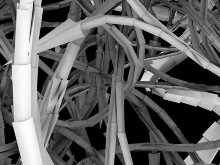An algorithm is a finite sequence of explicit, elementary instructions described in an exact, complete yet general manner. The application and execution of algorithms on a computer happens through programming languages, which enable computing procedures. This is a fundamental property of computation as a technical achievement, but also as a theoretical framework for design. Computation has a profound impact on a contemporary understanding of architectural form, space and structure. It shifts the way one perceives form, the way in which form is purposed, and the way in which form is produced. The fundamental concepts which underlie computational theory and techniques expose form as a subsidiary component of environment, and environment as a complex web of influences.
This seminar will investigate the potentials of algorithmic procedures for architectural design. It will provide an opportunity for the students to enhance their knowledge about algorithms both in regards to gaining the practical scripting skills and understanding the relevant theoretical aspects of form generation and related mathematical principles underlying patterns in the physical world. Based on the investigation of the related mathematics, relatively simple algorithms will be developed to produce complex systems within an architectural context.
The seminar language is English. Basic scripting and programming knowledge with Rhinoscript in VB or Python is a necessary prerequisite for this course (Participants of the previous seminar “Introduction to Computational Design” are welcome).
Each participant will get access to the entire library of different form generation scripts developed during the seminar.


